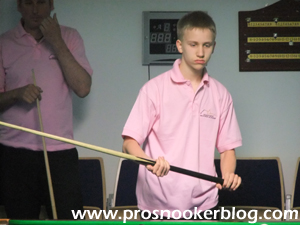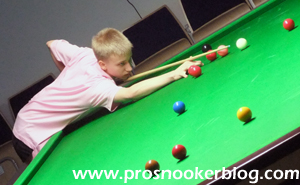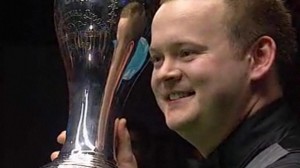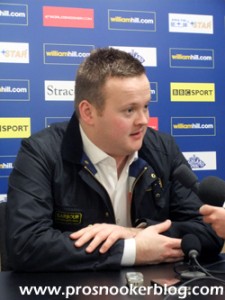
At the end of the 2010/11 season, the decision was taken by the WPBSA to remove the previous minimum age limit of 16, meaning that then 15-year-old Polish talent Kacper Filipiak was able to take his place on the main tour, becoming snooker’s youngest-ever professional. Last week 14-year-old Shane Castle came close to joining the him at a younger age still with his run to the final of the European Under 21 Championship and it raises again the question as to whether it was correct to remove the old age limit.
Click below for a discussion on the topic, with the thoughts of Shaun Murphy and Michael White, two players more qualified than most to talk on the subject…
A surprise winner of the 2011 European Under-21 Championship in April 2011, Polish youngster Kacper Filipiak became the first player to take advantage of the rule change allowing players under the age of 16 to compete on the main tour.
Initially Kacper’s results were to be positive as he impressed at last year’s World Cup, defeating John Higgins and Stephen Maguire with performances that moved three-time world champion Ronnie O’Sullivan to describe him as a future world champion, while Higgins drew comparisons between him and a young Stephen Hendry.
On the ranking event circuit however it proved to be a different story as including PTC tournaments, the Pole won just seven frames from 68 played during his first 14 tournaments, finding himself with no prospect of retaining his main tour place as he turned 16 in November 2011.
Taking those results into account, is it right that players as young as Kacper should be allowed to turn professional, or should a line be drawn, as was previously the case at 16?

On the one hand there is the argument that if they are good enough, they are old enough, and from a sporting point of view this is certainly logical. If a player is able to legitimately qualify for the main tour, why should they be denied their place on the tour, as for example Luca Brecel was on two separate occasions, before finally being permitted to turn professional this season? If a player is good enough at 14, why wait?
Certainly this is the view of 2005 world champion Shaun Murphy, who for reasons that escape me was able to compete on the pro circuit as a 15-year-old and is firmly in favour of the removal of the minimum age limit:
“Historically, the only reason that the age limit was ever 16 years of age is that back in the day, most tournaments were sponsored by tobacco companies and obviously there was a direct clash there of having young kids promoting tobacco firms. That was the only real stumbling block.”
“I would definitely stand by the thought process that if you are good enough, then you are old enough. I think that Steffi Graf turned pro at tennis at 13, I don’t think that anybody told her that she wouldn’t be able to cope mentally because she was ripping them up and I think that age limit has probably knocked a few people in the past who got to that age and were good enough but weren’t allowed to before.”
“I’m a definite supporter of getting rid of the age limit and people going through the system and qualifying earn their right, then they deserve it as much as someone who has been on the tour for 20 years and is slipping down the rankings. I’m all for it.”
As Shaun makes reference to, the counter-argument however is that at such a young age, the psychological impact of a run of results such as that experienced by Kacper this season, could be damaging long-term and that there should therefore be a limit as to when players can turn professional.

Again there is a degree of logic to this, snooker is mentally tough when things are going badly, for any player, let alone a youngster and there is an argument that until they have completed full-time education, youngsters should not be exposed to the pressures that come with competing on the tour.
As someone who was exposed to the professional circuit at that age however, Shaun believes that this was to his benefit:
“I had a mixed bag of results when I first got involved in the game. I loved it on tour but my game was so raw that I lost a lot of matches that I shouldn’t have lost, from positions that I never should have lost from and I did a lot of learning.”
“I was relegated after year one, was on and off and then spent 2-3 years on the Challenge Tour, watching all of the people I had qualified with go on to bigger and better things. When I was on the Young Players of Distinction Course, I wasn’t on the tour at the time and it was very strange turning up to meetings with the other five lads, four of whom I think were on the tour, and kinda felt out of place really as some of the meetings were at the main venues and I wasn’t there taking part.”
“My memories of my first season were that it was straight in at the deep end playing with the established pros who could play the game and I lost a lot of matches that I shouldn’t.”
“Definitely getting on and getting stuck in helped me and I think it helps everybody because if you are young enough and you get on, and you are good enough to make it work, then fantastic, you can have many years in the game. If on the other side of it you get involved in the game and you end up not being good enough, then surely it’s better that you find that out at a younger age rather than spend 15 years doing something that you are not good enough to win tournaments at and you can go onto bigger and better things?”

“There are tough lessons but I think that it is something that you have got to learn, heavy defeats are nothing to do with age, in my opinion they are to do with your game. The quicker he [Filipiak] can learn and gain experience, the quicker he can make progress because he has obviously got the game, he has obviously got the ability to play snooker to a very high level, otherwise he wouldn’t have qualified and got to the tour. I just think that it is a great problem to have.”
“It’s what every other sport has had, young child prodigies coming through and doing things that people said they could never do and life is full of people like that who break the mould and do things that they are not meant to do. It’s a great problem for snooker to even consider having, kids playing who are good enough to be mixing it with the pros at 13, 14 and 15. It happens in every other sport and it is great to see it happening in snooker.”
“You are putting them in a position where they can be emotionally damaged, I get that, I completely understand that. But you are also putting them in a position where they could carve out a life for themselves and go and smash some records and become household names and have a fantastic life out of a sport that they love. You are giving them the opportunity to do one or the other.”
Another player who qualified for the main tour at the age of 15 was Welshman Michael White, although he was not able to compete until his 16th birthday which led him to miss the qualifiers for the 2007 Shanghai Masters which fell before that date.

I spoke with him at the UK Championship qualifiers last season about the situation facing Kacper Filipiak at the time:
“The thing is they [young players] have got to go through it, whether it is now or at 18 or 19. I think it is looking like unless he [Filipiak] does drastically well that he is going to drop off the tour, but he will only get stronger for that. Obviously it will keep hurting him when he loses all the time and I went through it as well when I was 16, but if he can learn and try to come back then he will be better for it.”
“I remember coming back after I kept losing in the first round forever. I said that I’m not playing any more but a couple of days later I just wanted to play. But just losing all the time was just horrible.”
“It was a lot to take but if he loves the game he will come out stronger.”
It is certainly an interesting debate and I know from past experience that there are strong views either way as to where the right answer lies.
As I often tend to conclude when it comes to these debates, it is hard to say what that answer is, indeed it is probably something that depends on the individual person as I am sure that there are 15-year-olds who are more mature than other 17-year-olds, which is another argument against the arbitrary age limit in place previously.

Furthermore when considering the issue as a fan, not just of snooker but of many sports, I concur with Shaun when he draws parallels with other sports. For example former world number one tennis player Rafael Nadal was competing on their tour as a 15-year-old, players of that age have competed in the football league and last year the bar was also lowered in first-class cricket
Perhaps then thought should not be given to the particular age at which a player should be allowed to turn professional, but the initiatives and the measures in place in order to nurture those who are good enough at an early age to help them in the early years. It is crucial that the right support exists, not just from parents, but also from the governing body who if they are going to allow very young players to turn professional, have a responsibility to help them when they do.
While issues such as money lists and PTC events might be more obvious discussion points at present, sooner rather than later a real youngster is going to make it on the tour, whether it be Shane Castle or someone even younger and I await with interest seeing just how they get on…
All comments welcome….
